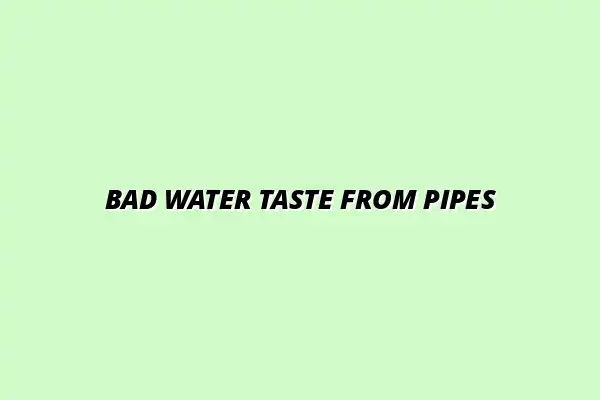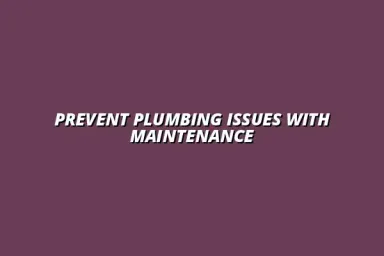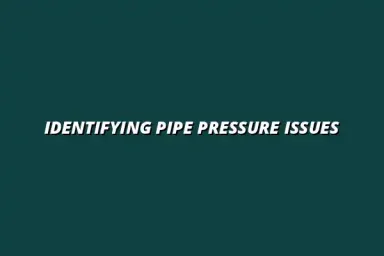Understanding Water Quality and Its Impact on Taste
Water quality is essential not only for our overall health but also for how we perceive its taste. When we think about clean drinking water, we often overlook the many factors that contribute to its quality. The taste of water can indicate underlying issues, and understanding these factors helps us appreciate why clean water is so vital!
Several elements affect water quality, including the presence of contaminants, the materials used in pipes, and the source of the water. In fact, the taste can often serve as an early warning sign of potential problems. That's why it’s beneficial to explore the relationship between water quality and taste. Regular maintenance of your plumbing system, as described in this helpful guide on maintaining plumbing to prevent repairs, can significantly impact water quality.
The Importance of Clean Drinking Water
Clean drinking water is critical for our health and well-being. It not only hydrates our bodies but also supports several bodily functions, such as digestion, circulation, and temperature regulation. Moreover, the importance of clean drinking water extends beyond just hydration; it also affects our overall quality of life!
- Prevents waterborne diseases
- Promotes better digestion
- Enhances cognitive function
When water quality is compromised, it can lead to serious health issues, highlighting the need for regular monitoring and maintenance of water systems. Recognizing the importance of clean water helps motivate communities to invest in infrastructure improvements.
Health Implications of Poor Water Quality
Drinking water contaminated with harmful substances can lead to various health problems. These range from short-term effects like gastrointestinal issues to long-term consequences such as kidney damage or developmental issues in children. Knowing the potential risks associated with poor water quality can encourage us to advocate for better systems!
Common contaminants include:
- Bacteria and viruses
- Heavy metals like lead and copper
- Chlorine and its by-products
Understanding these health implications serves as a reminder of why we must prioritize clean drinking water for ourselves and future generations. For example, understanding how to troubleshoot your gas water heater, as detailed in this troubleshooting guide, is crucial for maintaining safe and efficient water heating.
The Role of Taste in Water Quality Perception
The taste of water plays a significant role in how we perceive its quality. A strange or unpleasant taste can lead to hesitation when it comes to drinking. Often, taste can be the first indicator that something is off with our water supply!
When we encounter bad-tasting water, we may notice:
- Metallic flavors
- Chlorine-like odors
- Earthy or musty notes
Learning to recognize these flavors helps us identify potential problems with our water quality. It's essential to listen to our taste buds, as they can be our body's way of signaling that something needs attention! Regular drain maintenance, as explained in this article on regular drain maintenance, can also prevent issues that might affect water taste.
Identifying Pipe Issues That Affect Water Taste
Understanding how pipes affect water taste is crucial for maintaining clean water. Various issues can arise from the materials and conditions of pipes, which can lead to undesirable flavors in our drinking water. Identifying these problems early can save us from health risks and improve our water quality. Learning to detect hidden pipe leaks at home is a crucial first step in maintaining good water quality.
Moreover, being aware of common pipe issues helps us take proactive steps to ensure our drinking water remains safe and tasty. Let’s delve into the types of pipe problems that can seriously impact our water quality!
Addressing Bad Water Taste Due to Pipe Issues
When we notice an unpleasant taste in our drinking water, it's essential to act promptly. Bad water taste can stem from various pipe issues, and addressing these problems can significantly enhance our drinking experience. Fortunately, there are immediate actions we can take to improve water taste as well as long-term solutions to ensure ongoing water quality. Maintaining your kitchen plumbing, as outlined in this guide on maintaining your kitchen plumbing basics, is a great place to start.
First, let's explore some immediate actions we can implement to tackle bad water taste effectively. By being proactive, we can often resolve these issues before they escalate further!
Immediate Actions to Improve Water Taste
Improving the taste of your water can often be achieved with a few straightforward steps. There are two main strategies to consider: flushing the system and using water filters. Both methods can provide quick relief from the unpleasant tastes that may be lingering in your pipes.
Here’s how to flush your system effectively:
- Turn on all your faucets and let the water run for a few minutes. This helps to clear out any stagnant water.
- Start with the faucets that are farthest from the water main, and work your way to the nearest ones.
- Consider flushing your toilets as well to ensure that water is refreshed throughout your plumbing system.
Flushing Your System: Best Practices
Flushing your system can help remove debris and contaminants, but it’s important to do it correctly. Here are some best practices to keep in mind:
- Flush your system regularly, especially if you haven’t used the water for an extended period.
- Be mindful of flushing during off-peak hours to avoid overwhelming the water supply.
- Monitor your water taste after flushing; if it doesn't improve, consider checking your pipes for further issues. Understanding the causes of bursting water pipes can help prevent future problems.
In addition to flushing, using water filters can be an effective way to enhance your drinking water’s taste. Let’s look at the types available!
Using Water Filters: Types and Effectiveness
Water filters come in various forms, catering to different needs and preferences. Here are some common types of filters you can consider:
- Activated Carbon Filters: These are popular for removing chlorine, sediment, and other contaminants that affect taste.
- Reverse Osmosis Systems: Ideal for comprehensive filtration, these systems can effectively remove a wide range of impurities.
- Faucet-Mounted Filters: Quick and easy to install, they offer convenient access to filtered water directly from your tap.
- Pitcher Filters: These are portable and provide a simple solution for improving water taste at home or on the go.
Long-term Solutions for Pipe-Related Water Quality Issues
While immediate actions can make a difference, it’s also vital to consider long-term solutions to ensure consistent water quality. Addressing underlying pipe issues can prevent recurring taste problems in your drinking water. If you require professional plumbing services in Billesley, Birmingham, consider checking out this local plumber.
Some effective long-term solutions include replacing old pipes and implementing regular maintenance routines.
Pipe Replacement Options and Considerations
If your pipes are old or corroded, it may be time for replacement. Here are a few options to consider:
- PVC Pipes: Lightweight, durable, and resistant to corrosion, these are a popular choice for many homeowners.
- PEX Tubing: Flexible and easy to install, PEX is a great alternative for modern plumbing systems.
- CPVC Pipes: These offer high resistance to heat and corrosion, making them suitable for both hot and cold water.
Before replacing your pipes, consult with a professional to understand the best materials and practices for your specific situation.
Regular Maintenance and Inspections: Preventive Measures
To keep your water quality in check, regular maintenance is key. Here’s what you can do:
- Schedule yearly inspections of your plumbing system to catch potential issues early.
- Flush your water heater periodically to remove sediment build-up.
- Be aware of signs such as leaks or unusual noises that may indicate pipe problems.
By staying informed and proactive, you can significantly improve the taste and safety of your drinking water! Addressing pipe issues not only enhances taste but also contributes to your overall well-being.

 Kiran Almasi
Kiran Almasi

